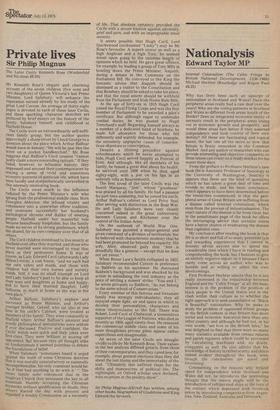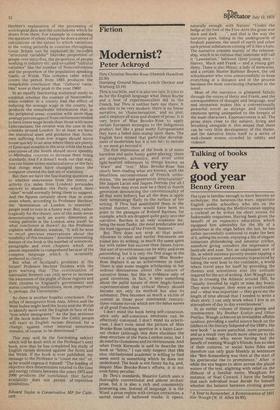Nationalysis
Edward Taylor MP
Internal Colonialism (The Celtic Fringe In British National Development, 1536-1966) Michael Hechter (Routledge and Kegan Paul £6.25) Why has . there been such an upsurge of nationalism in Scotland and Wales? Have the peripheral areas really had a raw deal over the years? Why are the voting patterns in Scotland and Wales so different from areas South of the Border? Does an integrated economic entity of necessity result in the peripheral areas losing out in economic growth and prosperity, and would these areas fare better if they asserted independence and took control of their own destiny? All these are fascinating and topical issues, the last one all the more so now that Britain is firmly enmeshed in the Common Market. And any author or researcher who can provide interesting and objective comments on these issues can count on a ready market for his wares these days.
From the preface to Professor Hechter's new book (he is Associate Professor of Sociology at the University of Washington, Seattle) it appears that these are the kind of questions which he has taken a great deal of time and trouble to study, and his basic conclusion, which appears to have been determined before the researches commenced, is that the peripheral areas of Great Britain are suffering from a disease called internal colonialism, which stem from the process of industrialisation. The exact nature of the disease is far from clear, but in the penultimate page of the book he offers the encouraging advice that socialist states have a better chance of eradicating the disease than capitalist ones.
My conclusion after reading the book is that life is so short and full of so many potential rich and rewarding experiences that I cannot in honesty advise anyone else to spend the considerable time which I have in reading and comprehending the book, but I hesitate to give an entirely negative report on it because I have rarely come across an author who was so humble and so willing to admit his own shortcomings.
First Professor Hechter admits that he is not really interested in the relationship between England and the -Celtic Fringe" at all. His basic interest is in the problem of the position of black people in the United States and in the clash within their culture as to whether the right approach is to seek assimilation or -Black is Beautiful" nationalism. Why he seeks to study the problem of oppressed ethnic groups in the British context is that Britain has more social and economic historical data than any other country and although he had not, in his own words, "set foot in the British Isles," he was delighted to find that there were so many many statistics available from census returns and parish registers which could be processed by calculating machines and, no doubt, computers as well. He also admits that his knowledge of history is rather scanty and this is indeed evident throughout the book, even though the conclusions are novel and interesting. •
Commenting on the reasons why Ireland opted for independence while Scotland and Wales did not, he introduces the interesting thought that the reason might well be the introduction of refrigerated ships at the turn of the century which depressed Irish livestock prices by introducing competition from Argentina, New Zealand, Australia and Denmark. Hechter's explanation of the processing of sociological data and the conclusions which he draws from them. For example in considering the question of ethnic change he does a series of calculations on the extent to which variations in the voting patterris in counties throughout Great Britain can be explained by so-called "structural variables" likeerthe proportion of people over sixty-five, the proportion of people working in industry etc. and so-called "cultural variables" like the number of Nonconformists and the proportion of the population speaking Gaelic or Welsh. This complex table which covers the period from 1885 produces the remarkable conclusion that "cultural variables" were at their peak in the year 1966!
In an equally fascinating statistical study to establish whether the number of Noncomformists resident in a county had the effect of reducing the average wage in the county, he produces the remarkable information that in the peripheral areas, counties with more than average percentages of Noncomformists tended to have lower wage levels than those with more Episcopalians; the reverse was the case in the counties around London. So at least we have the statistical asset and guidance that Scotsmen suffering from low wages should move house quickly to an area where there are plenty of Episcopal steeples in the area while the brash executives of the South should move speedily to-Methodist counties to increase their living standards. And if it doesn't work out that way, you can blame either statistical error or the fact that things must have changed since the computer chewed the last set of statistics.
But then we have the fascinating question as to whether remoteness from the centre of activity (i.e. miles from London) persuades electors to abandon the Party which their "class" would normally bring them to support. And the figures certainly show that in some areas where, according to Professor Hechter, the "domination of London is resented," people tend to vote in a funny way. But, rather tragically for the theory, one of the main areas demonstrating such an eratic dimension in voting patterns is the London area itself! So what conclusion is drawn? As the Professor explains with distinct wisdom, "It will be wise to recall •previous reservations about the reliability of this measure." Another interesting feature of the book is the number of sentences, paragraphs and even chapters which are almost impossible to comprehend because of the complex language which is in variably preferred to clarity.
But what of Scotland's problems in the future? Professor Hechter finishes with the grim warning that "The continuation of nationalist ferment can only serve to increase the awareness of the plight of these regions and their citizens to England's government and status conferring institutions, most importantly, perhaps, the Universities."
So there is another hopeful conclusion. The influx of immigrants from Asia, Africa and the West Indies might lead the Scots and the Welsh to identify more with the English in face of the "non-white immigrants." As the last sentence of the book indicates "How the Celtic people will react to English racism directed, for a change, against other internal minorities remains, of course, to be determined."
This may well be the fascinating subject which will be dealt with in the Professor's next book, now that he has completed his study of English racism directed against the Scots and the Welsh. If the book is ever published, my message to the Professor is "count me out" or, as he would express it himself: "The loading of objective data determinates rotated to the time and energy criteria between the years 1975 and 2000 produces the conclusion that factor availability does not permit of repetition possibilities."
Edward Taylor is Conservative. MP for Cathcart.



































 Previous page
Previous page